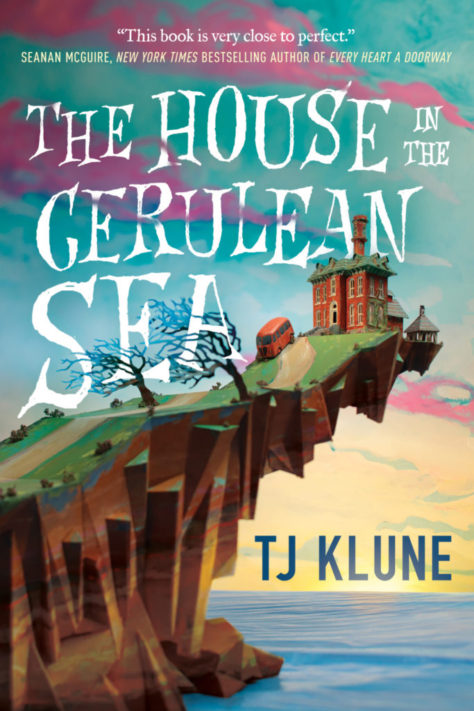‘The House In The Cerulean Sea’: Overpowering, But Fundamentally Unique

Out of the 20 book choices I was given to review, I found myself immediately drawn to the title and summary of The House in the Cerulean Sea. A book about magic? Check. Themes of order, love, identity and suppression. Double check. The unique word ‘cerulean’? Sold.
The House in The Cerulean Sea by T.J Klune is a multi-award winner. Not only is the young adult novel a bestseller in the New York Times, USA Today and Washington Post, it also won the 2021 Alex Award and 2021 RUSA Reading list. The book certainly offers some unique contributions within the fantasy and young adult genres, and it is backed by a robust plot with thought-provoking themes and lovable characters. Yet, I cannot help but feel that the style of writing is slightly overpowering, making this read a bit of a miss.
A Fresh Perspective within Fantasy Fiction
The strength of this novel lies in its unique perspectives. For one, Klune chose to write from the point of view of Linus, an everyday government worker, rather than the magical superhero that one would expect from the fantasy genre. You might get slightly frustrated at the lack of magical powers that Linus possesses (I was honestly waiting for him to unleash some untapped ancient magic), but you’ll otherwise still be drawn to his journey of growth and courage. In fact, I found myself appreciating the fact that Linus doesn’t become the hero in the traditional sense. It makes the story more grounded, giving us hope that while we may not be able to become a Captain America or Thor, we can at least make do with being a Linus.
I also particularly enjoyed the angle Klune went for for the romance in the story. The subplot makes you reconsider the notion of love along the lines of sexual orientation and age, ultimately providing a fresh addition to LGBT literature and a unique perspective to the romance and fantasy genres. I can clearly see why Klune was particularly noted for his contributions to LGBT works. In 2013, his novel, Into this River I Drown, won the Lambda Literary Award, an award recognising the best of LGBTQ books.
Robust themes packed into a solid story
Klune’s novel is a solid display of multiple themes expertly woven into the lives of its many characters. The conflict between the authoritative DICOMY and the children of the orphanage show the difficulties of those who struggle to fit into a system that is designed against them. We are able to compare the actions of characters across a spectrum – from Extremely Upper Management to the bystanders of the island, enabling us to understand the power of the individual in creating change.
And Klune doesn’t just throw these themes in a mess at you. He develops them within a very nicely-packed story about a man’s unwanted introduction to adventure. As Linus opens himself up to opportunities outside his comfort zone, I found myself reflecting upon my own responses to my life experiences. Ultimately, Klune shows that no matter your age or stage in life, there is always an opportunity for growth, if only one is willing to respond to it.
However, the hyperbolic writing can be overwhelming at times
Klune writes in a comedic fashion, using exaggeration and caricurisation to evoke a humorous response. While I thought Linus’ klutzy way of interacting with the world was funny at first, I did observe that this descriptor of the main character tended to be overused. At some points of the novel, Klune over-caricurises his observations of daily life, making the writing unnecessarily dramatic.
This exaggerated manner of writing, while intended to create humour, also has the side effect of reducing the nuances of Klune’s characters. I saw this especially with the characters within DICOMY. The use of archetypes to emphasise the stifling, bureaucratic nature of government work became too unrealistic, diluting Klune’s central argument about the dangers of blindly following the rules and regulations.
Finally, the dilemmas faced by the characters were a tad too simplistic for me

I say this while keeping in mind that the book is intended for young adult readers. There is a danger of making the story too complex for such readers, I agree, but I felt that Klune was playing it too safe. There is too clear a division between good and evil, and Linus doesn’t really face a dilemma that involves a particularly gut-wrenching sacrifice. I also wished that there would have been a greater focus on the backstories of the children of the orphanage, which would have nicely added more nuances to their current behaviour.
While Klune did a fantastic job in introducing the gay romance in the novel in a sensitive way for younger readers, I wasn’t particularly drawn into the romantic dilemna as a subplot. Some of the interactions were more mechanical than organic, and there were portions of the writing that focused too much on the thought process of the characters in love. In other words, Klune brought in some refreshing themes through this book, but there were gaps in his delivery.
Still a good commuting read
I apologise if some of my criticisms about this book were sharp. I might have opened this book with extremely high expectations, given my fascination with the fantasy genre. Unfortunately, I must also remind myself that I am no longer the young adult that this book was intended for. Nevertheless, The House in the Cerulean Sea should still be a solid read for long commutes on the way and back from work. You’ll find yourself smiling throughout, even if you found the delivery of the story a little bit over the top.
Overall Rating: 3.2/5
Reviewed by: Haris Arman Thong, Publicity Assistant Director, ReadNUS

